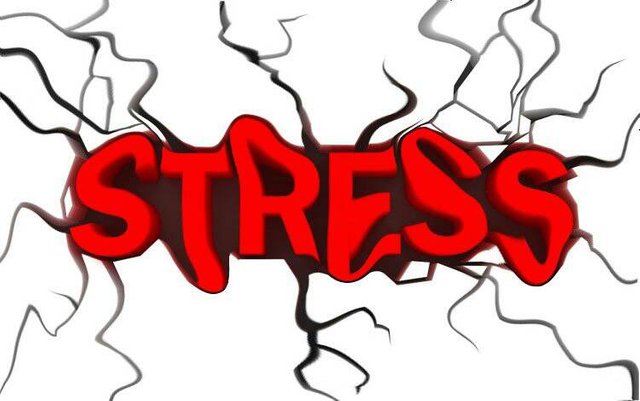Today I want to share an anecdote and an article about the true meaning of stress and its psychophysiological consequences!
Some time ago I was intrigued to know the cause of why my mind is so anxious and my body shows moments full of anxiety, sometimes bad humor, anger, lack of appetite (even though I ate a lot), strange spots on my body. face, insomnia, nausea, my body tense, my neck especially, sometimes headaches, sadness, in short, I've experienced all that, why? Well we go to the psychological, I went through a breakup of love joining the worst of the evils (the economic crisis of my country), "frustrating" every small achievement, ambition, success, feeling, needs and personal desires that only me they are, nowadays people live very stressed, and more in countries that face crisis, and clear stress not only depends on social circumstances, but the psychology of each individual, (for example those who drown in a glass of water ) Well thanks to all these little experiences that I have gone through, I have felt better and more cultured, because I share the idea that people grow more, according to their concern to solve their needs and problems, and that is why I want to share this article of sum importance that many will know and others will not!
The main stress hormone that modify physical and mental functioning is called cortisol.
Stress is a feeling of physical or emotional tension that can come from any situation or thought that causes feelings of anxiety, nervousness or frustration.
.jpg)

When a person suffers stress, he not only undergoes psychological changes, but also undergoes a series of alterations and physical changes.
In this article we will talk about how these physical changes are made and we will explain the functioning of stress hormones.
What is stress?
Stress is considered a state of tension and anxiety perlongado in time, which causes a series of alterations and a feeling of discomfort in the person who suffers.
In this way, Bruce McEwen defined in the year 2000 stress as a real or supposed threat to the physiological or psychological integrity of an individual that results in a physical or behavioral response.
For its part, in medicine, stress is referred to as a situation in which the levels of glucocorticoids and catecholamines in circulation are elevated.
So, with the first approaches to the term of stress, we already see two clear things:
On the one hand, stress is an alteration of psychological origin that causes a series of changes in the physical functioning of the body.
In the stress is involved the activity of different hormones, which cause body changes in a direct way.
To understand the effects of stress well, we must bear in mind that when we suffer from these conditions, our body suffers from a lack of harmony in homeostasis.
Thus, homeostasis is a basic concept to understand stress and its hormonal implication.
This concept refers to the idea that the body has an ideal level of oxygen in blood, acidity and body temperature.
In this way, these physical variables are maintained in an optimal state through homeostasis, which allows the correct physiological functioning of our body.
However, when a stressor appears, that is, an element of the external world that can destabilize us, our body moves away from the homeostatic balance and the variables of our body can be modified.
Thus, before the threat of suffering an aggression, our body modifies the homeostatic balance, and increases blood supply, heart rate, muscle tension or sweating among others.
But beware, this change does not in itself constitute a state of stress, since our body activates more than normal in an emergency to be able to respond in a faster and more effective way.
If our body has more stressed muscles, we sweat more easily and we have a higher heart rate, we will be more prepared to perform a rapid behavioral response than if our body is in a relaxed state.
In this way, stress appears when the alteration of the homeostatic balance and the corporal changes occur chronically, that is to say, we always have them and not only in specific situations that motivate the activation of the body.
If you suffer stress you will know what I mean, since you will notice your body activated and unpleasant physical sensations at all times.
So, when we suffer stress, our body is at all times as active as if we were responding to a situation limit.
In addition, the high activation that our body undergoes in the state of stress, causes many physical alterations, which make us more prone to get sick
This is explained because, as we have said, our body stops functioning through a homeostatic state, and our heart rate levels, blood supply, muscle tension, etc. They look altered.
And to a large extent, those responsible for these changes are the hormones that we release when we are stressed.
Hormones are chemical substances that are released by our brain to the whole body. The alteration of the functioning of these substances that are distributed in many body regions, immediately causes a series of physical changes.
Next we will review which hormones are altered in the state of stress, how they work and what harmful effects they can cause on our body.
Stress and hormonal changes
The main component of the stress response is the neuroendocrine system, and in particular, the hypothalamic-pituitary-adrenal axis of this system.
As we have said, in the face of stressful events (or interpreted as stressful) the sympathetic nervous system is activated, which immediately triggers the activation of the adrenal glands of the neuroendocrine system that we are discussing.
This activation stimulates the release of vasopressin in the hypothalamic-pituitary axis. The presence of this substance stimulates the pituitary gland to release another hormone, corticotropin, into the general circulation of the body.
Cortisol is considered the stress hormone par excellence because the body manufactures it in emergency situations to help us face the problems and to be able to make a quick and effective response.
In this way, when we are stressed the release of cortisol goes off.
In normal situations (without stress) the cells of our body use 90% of the energy in metabolic activities such as repair, renewal or formation of new tissues.
However, as we have said before, in situations of stress, our brain sends messages to the adrenal glands so that they release greater amounts of cortisol.
This hormone is responsible for releasing glucose into the blood to send greater amounts of energy to the muscles (to better activate our tissues), so when we are stressed we perform a greater release of glucose through cortisol.
And what does this mean? as we have been commenting, in specific stressful situations, this fact does not have negative effects on our organism, since once the emergency is over, the hormonal levels return to normal.
However, when we have stress on a regular basis, cortisol levels are triggered continuously, so we spend a lot of energy to release glucose into the blood, and the functions of recovery, renewal and creation of new tissues are paralyzed.
In this way, stress can have a negative effect on our health, since we will have a hormonal dysregulation.
The first symptoms of having high levels of cortisol for a long time are lack of sense of humor, irritability, feelings of anger, permanent tiredness, headaches, heart palpitations, hypertension, lack of appetite, digestive problems, and pain or muscle cramps.
It affects the sex hormones.
With stress is also altered the functioning of three sex hormones: estrogen, progesterone and testosterone, high levels of stress can cause dysregulation of sexual functioning in women and alter the menstrual cycle.
Thank you for your time, for more detailed information, here the source
https://www.lifeder.com/hormonas-del-estres/
interesante información
i like this post
Very interesting vlog!
buen post amigo
Buen post tienes mi voto
good :*